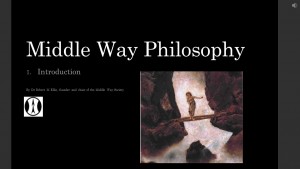This series of short videos can form a reference to find out about a Middle Way approach to some key topics. They are all produced by Robert M. Ellis, using diagrams, pictures and voiceover (no talking heads). They also together provide an introductory course in Middle Way Philosophy. There are reflection questions and suggested further reading on the page for each video to help stimulate your thinking further. To start the introductory course, click the orange buttons starting at the bottom of this page, and thereafter to advance you to the next video each time. The orange buttons will lead you first through introductory videos on each of the 5 principles of the Middle Way (scepticism, provisionality, incrementality, agnosticism and integration), then at the next layer of detail of connected areas for each of these principles.
Middle Way Philosophy Introductory videos
1. Introduction


Nicely chanced here by your very helpful exposition on Iain McGilchrist’s The Master and His Emissary, thank you.
And discovering your Middle Way Philosophy so well laid out here is an added bonus.
I look forward to engaging your ideas and practice to see if you are “Voluntaryists” (all governments are unnecessary evils), and if not, are influenceable towards this, as this moral position is, I consider, the most meaningful of all the in-between means.
Scire Licet, Responsibly Free Jack in New Zealand.
Thanks, Jack. By a ‘voluntaryist’ do you mean an anarchist? Your definition of it sounds like anarchism as I would understand it. I wrote an article about anarchism on the site here: https://www.middlewaysociety.org/the-middle-way-to-anarchy/. Personally, no, I am not an anarchist, and it does seem obvious to me that governments are necessary in practice. Absolute belief in the value of freedom over anything else (or the opposite, complete dismissal of the value of freedom) are examples of opposing absolute beliefs that the Middle Way means navigating between. However, I realize that there are different ways of interpreting anarchism, and my article goes into that.